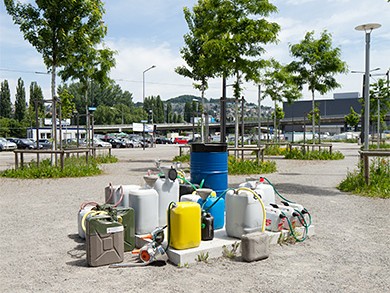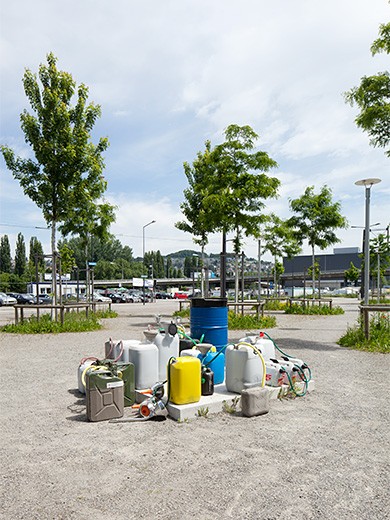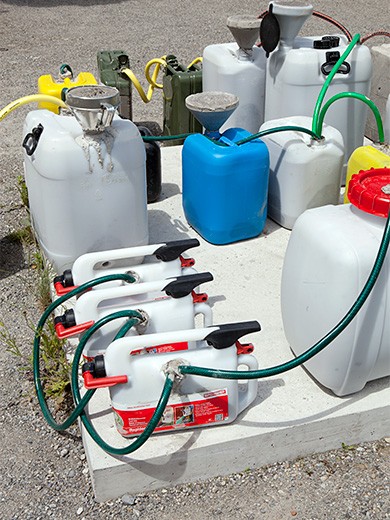Matias Faldbakken
Fuel Sculpture, 2015

Das heterogene Werk des intermedial arbeitenden Matias Faldbakken (*1973, NO) basiert auf der Auseinandersetzung mit gesellschaftlichen Normen, wobei er sich mit den Definitionen, der Transformation und Interaktion des Normativen und Marginalen beschäftigt. Im Zuge dessen ist seine künstlerische Praxis von einer Attitüde geprägt, in der Verweigerung und Destruktion mit produktiven Formen des Chaos und des Vandalismus verschmelzen.
Faldbakkens Bilder, Skulpturen, Videos und Installationen stehen – ebenso wie der Duktus seiner Romantrilogie Skandinavische Misanthropie (Blumenbar Verlag, München) – für eine subtile Auseinandersetzung mit der Frage, ob es überhaupt noch eine Form von Verweigerung und Unangepasstheit gibt, die nicht sogleich populär wird. Vor diesem Hintergrund spielen Aggression, Reduktion und Abstraktion in Faldbakkens künstlerischer Praxis zentrale Rollen, indes das Spiel mit der Negation zum innovativen Ausgangspunkt für seine Arbeiten wird. Doch das «Nein», das seine Werke zu skandieren scheinen und von der Kunstwelt als «konzeptueller Nihilismus» etikettiert wurde, ist zuletzt eine positive, zur Reflexion anregende Geste.
Die am Vulkanplatz in Altstetten installierte Fuel Sculpture konfrontiert den Betrachter mit der radikalen Verknappung eines künstlerischen Verfahrens: Die Herstellung von Skulpturen wurde hier auf den einfachen Akt des Giessens von Beton in Benzinkanister und Trichter reduziert. Aus einer solchen, von pragmatischer Unkompliziertheit geleiteten künstlerischen Produktion resultiert die Fuel Sculpture, in der eine laxe Do-it-yourself-Ästhetik auf konnotierte Alltagsgegenstände trifft: Benzinkanister, die im öffentlichen Raum eine latente Gefahr signalisieren. Dabei stehen vollends aus ihren Gussformen geschälte Betonskulpturen neben teilweise oder noch gänzlich ummantelten Betonfüllungen, die den Unterschied zwischen Skulptur und Gussform aufheben. Im Kontext des Vulkanplatzes, der etymologisch auf Vulcanus, den römischen Gott des Feuers, und stadthistorisch auf die einst in Altstetten ansässige Automobil & Motorboot Fabrik Vulcan AG verweist, baut Faldbakkens Fuel Sculpture als intervenierende Geste ein Netz vielschichtiger Assoziationen auf. Florian Keller
Courtesy the artist und Galerie Eva Presenhuber, Zürich
English Version
The heterogeneous oeuvre of intermedia artist Matias Faldbakken (b. 1973, Norway) is based on examination of societal norms, whereby he addresses the definitions, the transformation and the interaction of the normative and the marginal. All the while, his artistic practice is characterised by an attitude that merges non-compliance and destruction with productive forms of chaos and vandalism.
Faldbakken’s paintings, sculptures, videos and installations, much like the style of his Scandinavian Misanthropy trilogy of novels (published in German by Blumenbar Verlag, Munich), represent a subtle examination of the question of whether there is any remaining form of non-compliance or non-conformism that does not readily become popular. Against this backdrop, aggression, reduction and abstraction play key roles in Faldbakken’s artistic practice, where playing with negation becomes an innovative starting point for his works. However, the “no”, which his works seem to chant aggressively, and which the artworld has labelled “conceptual nihilism”, is ultimately a positive gesture that prompts reflection.
The Fuel Sculpture installed at Vulkanplatz in Altstetten confronts the observer with radical abbreviation of an artistic process: here, the manufacture of sculptures has been reduced to the simple act of pouring concrete into petrol cans and funnels. Such art production, governed by pragmatic straightforwardness, results in Fuel Sculpture, in which easy-going do-it-yourself aesthetics encounter connotative everyday objects: petrol cans, which, in the public space, signify a latent danger. Here, concrete sculptures that have been completely stripped of their casting moulds stand alongside partly, or still entirely, encased concrete fillings, nullifying the difference between sculpture and casting mould. In the context of Vulkanplatz, which refers (in terms of etymology) to Vulcan, the Roman god of fire, as well as (in terms of the city’s history) to the Vulcan car-and-motorboat factory once situated in Altstetten, Faldbakken’s Fuel Sculpture sets up a network of multilayered associations as an intervening gesture. Florian Keller
Courtesy of the artist and Galerie Eva Presenhuber, Zurich


